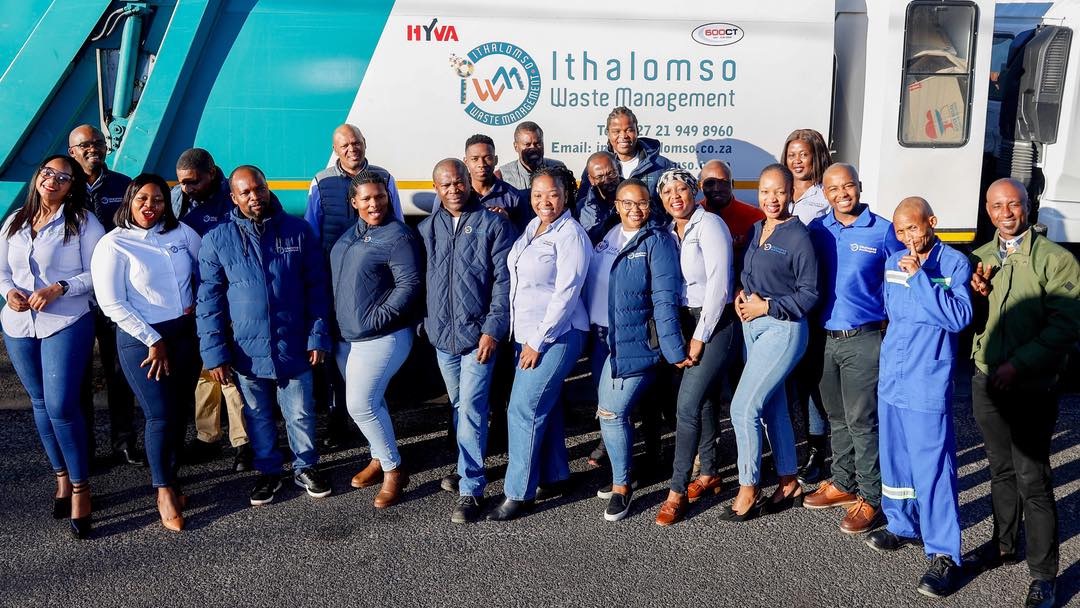Ithalomso Sweeps Opportunity Into Cape Town’s Margins
Caption:
Andile Ndevu, Ithalomso CEO
📷 SUPPLIED
A silent business revolution has been fermenting inside Cape Town’s municipal procurement system.
Some black-owned small and medium enterprises, previously marginalised from formal economic corridors, are now securing service contracts that range from construction to waste collection and security provision.
Cape Town’s procurement system, though imperfect, is becoming an empowerment scaffold for many black entrepreneurs, despite the often politicised and racially charged perceptions surrounding the region.
“One of the beautiful things about doing business in the City of Cape Town is the high level of professionalism and the fair advantages given to emerging businesses in the Western Cape – unlike in other provinces or municipalities, where you must know the MM [Municipal Manager] or be connected to someone to get a contract. Here, it is different,” says Ithalomso Waste Management CEO, Andile Ndevu.
Sebastian Jozi, Ithalomso’s finance director, adds that the city’s efficiency helps businesses avoid invoice discounting - a mechanism where invoices are sold to lenders at a discount for quick cash.
“City of Cape Town is very efficient in paying suppliers. You hear elsewhere that people are sitting with invoices for three or four months. In Cape Town, we don’t face those challenges – otherwise, I don’t know how we would have made it,” says Jozi.

Caption:
Ithalomso’s currently operates at eight sites across Cape Town, from Khayelitsha to Emfuleni📷 SUPPLIED
Among SA’s eight metropolitan municipalities, Cape Town consistently ranks in the top four by annual budget, trailing only Johannesburg and ahead of eThekwini and Tshwane. In its 2023/24 financial year, it managed an operating budget of about R60bn and a capital budget of R11bn. About R6.6bn was allocated to infrastructure.
The city spent R3.4bn on outsourced services including transport, refuse removal, sewage, electricity and waste haulage. In 2022/23, it spent R14.4bn on suppliers that are at least 51% black-owned, up from R12.4bn in 2021/22. For companies at least 30% black women-owned, nearly R8bn was spent, up from R7.2bn the previous year.
In 2023/24, the city signalled a shift in its procurement approach. It amended its policy to introduce a tender-scoring system that prioritises redress goals, moving away from awarding tenders based on BEE scores alone.
The revised system focuses on empowering black-, women- and disability-owned businesses, as well as SMMEs. BEE ratings are no longer a requirement for supplier registration or tender awards.
The city is expected to adopt a new policy being developed by National Treasury under the recently promulgated Public Procurement Act, replacing the Preferential Procurement Policy Framework Act.
Sweeping Forward
Ithalomso’s rise hasn’t come without risk. Two years ago, GroundUp reported that the company and fellow provider Wastemark suspended operations after threats from extortionists demanding “protection fees”.
Ndevu has used social media to speak out about intimidation. He says the company halts operations in areas where credible threats are received and reports incidents promptly to the police.
Ithalomso operates across eight Cape Town sites, from Khayelitsha to Emfuleni, and also provides waste services to Transnet. Its fleet of 12 vehicles - including refuse compactors, cage trucks, bakkies and light-duty vehicles - handles general and hazardous waste, litter and illegal dumping.
Jobs, Dignity and Multipliers
At street level, Ithalomso is more than a contractor. Thousands of women, dressed in navy-blue overalls with yellow reflector strips, sweep the pavements of Cape Town’s black residential areas. They are the face of a business that now employs over 3 500 people.
For many, Ithalomso is a livelihood and a means of restoring dignity in under-serviced communities.
“My ambition has always been to break the cycle of poverty and change my life - not just for myself, but for my family,” says Ndevu. “Ithalomso was born out of a vision to uplift ourselves, our families and our communities.”
From Site B to City Contracts
Ndevu’s story starts in Site B informal settlement in Khayelitsha. Raised by a single mother who worked as a domestic worker, his family migrated from Dimbaza in the Eastern Cape in search of better opportunities.
As a boy, he took the train to Langa Comprehensive School, which he says instilled discipline and built resilience.
He enrolled at the University of the Western Cape (UWC), but dropped out due to financial pressures. He took a part-time job at Telkom and later became active in youth politics, serving as provincial secretary of the South African Youth Council (SAYC).
When the SAYC executive was dissolved, he turned to entrepreneurship. He registered Ithalomso in 2012 with R2 000 and three co-founders, all of whom eventually left.
He operated from an internet café and a one-bedroom flat in Parow until 2016, when the company secured a small office and hired an admin clerk. Two more directors were brought on board that same year.
Strategy and the Jozi Effect
Ithalomso initially capitalised on state procurement opportunities. Around this time, Ndevu returned to UWC to complete a postgraduate diploma in public management.
In 2018, the company brought on Jozi, also a Dimbaza native and a trained accountant. At first, Jozi worked pro bono, as the company could not pay him.
He had previously run a tax consultancy and worked at Anglo American South Africa’s Zimele Sebenza Fund, where he helped fund emerging businesses. His experience proved vital in managing funders and building trust in a black-led start-up.
Future Plans
Over the next three years, Ithalomso - which means “a ray of light for the future” in isiXhosa - plans to grow its market, diversify services and invest in skills development.
It is expanding into specialised waste streams like construction rubble, medical waste and municipal sludge. It also aims to establish an environmental consulting division and launch a skills training academy.
rom humble beginnings to a multi-site operation that services public institutions and employs thousands, Ithalomso is more than a business success story; it is proof of what is possible when public systems enable, rather than exclude.


